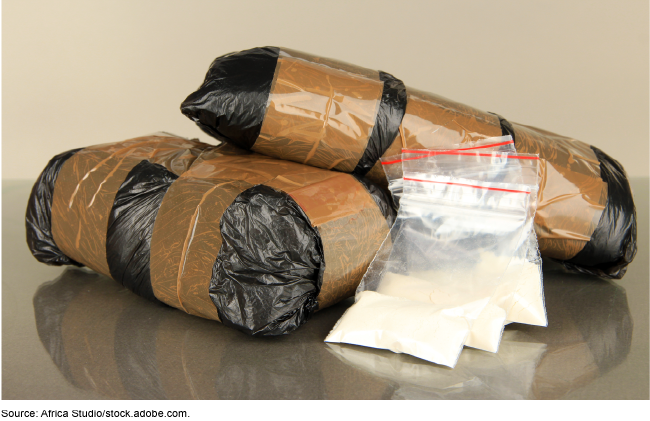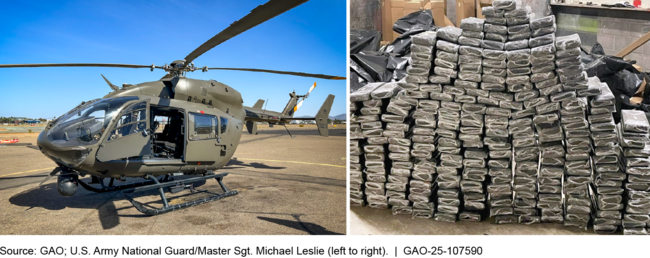Drug Control: DOD and National Guard Align Counterdrug Policies and Guidance with Federal Laws
Fast Facts
Drug overdose deaths in the U.S., including those from fentanyl, surged over the past 25 years.
To reduce drug trafficking and criminal activity, the Department of Defense and the National Guard help support federal, state, local and tribal law enforcement. The counterdrug support services they offer include information analysis, translation and transcription, and air and ground surveillance.
DOD and the National Guard Bureau work to ensure their counterdrug policies match up with the activities described in federal laws. DOD periodically updates its guidance to further clarify what counterdrug activities can be conducted.

Highlights
What GAO Found
As of February 2025, the Department of Defense (DOD) and the National Guard Bureau align their respective counterdrug policies with current federal laws. GAO did not find that the policies created limitations in terms of the counterdrug activities that DOD and the National Guard can conduct under the law. Section 284 of title 10, U.S. Code establishes categories of authorized counterdrug activities that DOD's counterdrug instruction groups into mission categories. Additionally, under section 112 of title 32, U.S. Code, members of the National Guard can perform counterdrug activities in accordance with a drug interdiction and counterdrug activities plan submitted by a state governor and approved by the Secretary of Defense.
Helicopter Used by the National Guard for Aerial Reconnaissance and Illegal Drugs Seized

DOD updated counterdrug policies and guidance during fiscal year 2020 through fiscal year 2024 to clarify limitations on implementation of counterdrug activities. However, GAO did not find that these changes prevented DOD personnel from conducting these activities. For example:
- In February 2021, the Secretary of Defense issued a memorandum that prohibits DOD counterdrug program-funded analysts from engaging in activities that would require additional authorities for collecting intelligence. According to DOD officials, this change was made to clarify what types of information counterdrug program-funded analysts are allowed to collect in accordance with the law and DOD guidance.
- In March 2022, DOD issued guidance that limited counterdrug support to community-based organizations that are specifically identified in federal law. According to DOD officials, this change was made to ensure that National Guard outreach aligned with federal law.
- In April 2024, DOD updated guidance to clarify that, while National Guard counterdrug analysts can analyze data extracted from digital devices such as cell phones, they cannot perform the extraction themselves. According to DOD officials, this change in guidance was made to ensure that National Guard counterdrug analysts were not involved in the handling of evidence.
Why GAO Did This Study
Drug overdose deaths in the U.S., including from synthetic opioids such as fentanyl, surged during the past 25 years, according to the Office of National Drug Control Policy. Congress appropriated approximately $1.33 billion dollars for the National Guard Counterdrug Program during fiscal year 2019 through fiscal year 2024. This program supports federal, state, local, and tribal law enforcement with drug interdiction activities in 50 states, the District of Columbia, Puerto Rico, Guam, and U.S. Virgin Islands.
The joint explanatory statement for the Consolidated Appropriations Act, 2024, includes a provision for GAO to review certain DOD and National Guard Bureau counterdrug instructions and examine whether they limit support for counterdrug efforts under the law. This report evaluates the extent to which (1) DOD and National Guard Bureau align their counterdrug policies with applicable federal counterdrug laws; and (2) DOD's changes in guidance during fiscal year 2019 through fiscal year 2024 clarified how counterdrug activities could be conducted.
GAO identified and reviewed federal counterdrug laws; evaluated relevant DOD and National Guard Bureau policies; and reviewed changes in DOD policies and guidance related to the implementation of domestic counterdrug activities during the past 6 fiscal years. GAO also interviewed DOD, federal law enforcement, and state National Guard officials. GAO also conducted site visits to locations in California and Texas.
For more information, contact Diana Moldafsky at moldafskyd@gao.gov.
